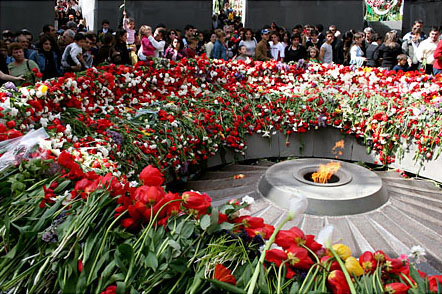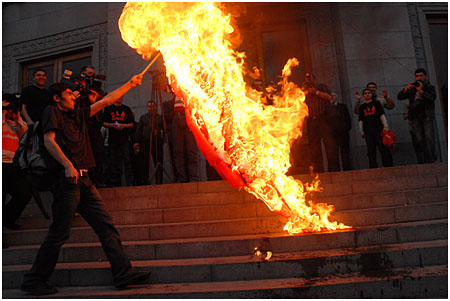
Tsitsernakaberd Genocide Memorial, Yerevan, Republic of Armenia © Onnik Krikorian 2008
Following last week's non-binding resolution narrowly passed [1] by a congressional Foreign Affairs Committee urging the US government to recognize the 1915 massacre and deportation of Armenians [2] in the Ottoman Empire as Genocide, reaction in the blogosphere appears to be muted, including from those Armenian sites which have covered the issue for years.
Nevertheless, what does exist is mostly negative or neutral — although not necessarily reflective of comments or posts, and even no reaction at all, on closed networking sites such as Facebook. Typical of most comments made there, Life in the Armenian Diaspora sums up that reaction [3].
Armenians around the world are celebrating again…. […]
[…]
Again, the White House wasn't able to stop this. Turkey wasn't able to stop it with their threats about relations, borders, protocols etc. I said it two years ago and I'll say it again now. EMPTY THREATS – CALL THEIR BLUFF! Turkey can not afford to lose the U.S. as an ally. They recalled their ambassador then and they recalled him now. BIG DEAL!

Armenian Revolutionary Federation (ARF) activists burn the Turkish flag, Yerevan, Republic of Armenia © Onnik Krikorian 2008
However, and in sharp contrast with previous years when similar resolutions were passed, other alternative voices are making their voices heard. Ianyan, for example, is uncertain as to what next this all means [4] for her as an ethnic Armenian living abroad.
Right after the vote, Turkey recalled its Ambassador, Namik Tan, back for consultations, Armenian publications swiftly posted the news, status updates and tweets exploded with joy and disappointment on both sides and the Obama administration, who had urged the committee to vote against the resolution, said it will seek to block the bill from coming into fruition.
[…]
As for me, for a moment, I was shocked and surprised, although I probably shouldn’t have been. A similar resolution passed through the same committee in 2007 and was later successfully blocked from ever amounting to anything.
[…]
While we sit in free countries, in our warm houses and flashy cars in our garages, many in Armenia are still suffering from economic turmoil and poverty . There is corruption and discrimination and much more that we, thousands of miles away, have the good fortune to not see. Most diaspora Armenians have never even met a Turk, nor do they want to. […]
Do I need the U.S. government to recognize the genocide? Maybe, but I don’t feel any less Armenian, I don’t feel like something is missing if they don’t. My feelings could very well be the result of it not being recognized for so long, who knows.
[…]
The answer still is, for me, “I don’t know.”

Armenian-Turkish border, Khor Virap, Ararat Region, Republic of Armenia © Onnik Krikorian 2005
Another Armenian blog, Global Chaos, however, is more critical [5], especially in light of a more pressing issue facing Armenia – the threat of renewed conflict with neighboring Azerbaijan over the disputed territory of Nagorno Karabakh.
Yes, they made a full circle and we are seeing the whole Armenian Genocide Resolution circus played out all over again. No, I'm not happy with what happened yesterday. I'm very concerned, and I don't think it's going to have ANY positive outcome for Armenia. On the contrary, it might, and I'm afraid, it will only make things worse.
[…]
American-Armenians are all upbeat about it. They learned well how to play this game called “American politics” and they want to stay politically relevant, especially this year, when the mid-term elections might turn out to be unusually interesting. […] But where's Armenia in this equation?
[…]
There is evidently a disconnect between the Diaspora, which, quite understandably, clings to the Genocide problem as a basis for its identity, and the Armenian state, which is striving to survive, attain stability, and establish itself as a significant player on the international arena. […]
[…]
Perhaps it's high time the Armenian government stops relying on the Armenian-American lobby to do both advocacy and public diplomacy in the US on its behalf? […] Yes, it is very commendable. But, it is also detrimental for Armenia, since the foreign policy of one of the most influential countries in the world toward it is being dominated by an issue the significance of which many, on both sides, don't even understand anymore.
Again, I am not saying that the Genocide should be neglected or forgotten. What I'm saying is that the focus should switch, since with the resolution of the Karabakh problem might just open a leeway for more constructive and reconciliatory dialogue on the Genocide as well. If the Diaspora lets Armenia be, that is…
The blog also raises concerns that such a resolution will increase the level of nationalism in Turkey, something that seems borne out by one Turkish blog [6], Talk Turkey.
Do the Armenians really think that some soiling-their-pants Congressmen care about the Armenians’ plight? Was this part of a ploy, a plan of pushing Turkey off-track and into radicalism, alienating the ‘model’ integration of secularism and Muslim-ness, and thereby prove to the ‘world’ that a moderate Islam doesn't exist?
[…] I am now definitely not in a reconciliatory mood any longer. In fact, I say ‘let the games begin!’

Tsitsernakaberd Genocide Memorial, Yerevan, Republic of Armenia © Onnik Krikorian 2008